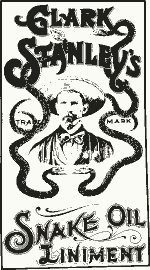Snake oil
Snake oil (from the English snake oil ) is the name for a product that is little or no real function has, but is marketed as a miracle cure for many problems.
The term snake oil comes from the mythology of the American Wild West , where self-proclaimed faith healers at medicine shows sold snake oil as a cure for ailments of all kinds. In the Anglo-American language area, the term snake oil is mainly used today as a synonym for quack product. The Germanization to snake oil only became common for the transferred use regarding dubious software products .
Snake oil software is often found in software areas whose technical background is difficult to understand for laypeople or requires a lot of training. Windy businessmen can easily find customers here by promoting their product using many important-sounding but meaningless technical terms. Most examples of snake oil software therefore come from the areas of cryptography , network security or increased performance.
In particular, the manufacturers of anti-virus programs are often criticized by IT security experts because their software does not protect customers, but exposes them to even more dangers. Since such programs usually run with extended rights and divert system access invisibly for other programs, security gaps in antivirus programs are particularly critical.
Examples
The company Syncronys Soft Corp. in 1995 sold a product called SoftRAM 95 , which should, according to advertising claims to double the usable memory in Windows by compression and further accelerate the computer system immensely. By disassembling the program, the magazine c't found that it displayed statistics drawn out of thin air and otherwise did not fulfill any other functions.
In April 2014, it was revealed that one of the most popular antivirus programs - Virus Shield by Deviant Solutions - was absolutely useless for Android . The only thing it could do was change an icon when you tap it. Despite this, Virus Shield had been installed thousands of times and was even at the top of the payment apps on Google Play. Google then refunded the purchase price to all buyers and apologized to the customers.
In the Chinese market in particular, energy-saving devices (so-called power savers) that are plugged into the socket are offered. They are supposed to reduce energy consumption. Inside there is usually a small capacitor and minimal electronics for the current of the LED. A university test could not prove effectiveness.
See also
Web links
swell
- ↑ Antivirus software: The snake oil industry - Golem.de . ( golem.de [accessed December 21, 2016]).
- ↑ "Placebo forte!", What is really behind SoftRAM 95 . In: c't magazine for computer technology . No. 12 , 1995, p. 100 ( heise.de [accessed September 24, 2012]).
- ↑ Google compensates buyers of useless virus scanners , accessed April 29, 2014
- ↑ Earthwise Power Savers fail laboratory test , uploaded on December 18, 2013

